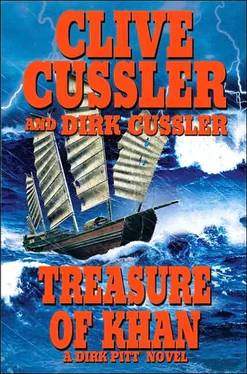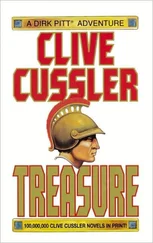Clive Cussler, Dirk Cussler
Treasure of Khan
For Kerry, with my love.
D.E.C.

The Emperor's Tempest
August 10, 1281 A.D.
Hakata Bay, Japan
Arik Temur peered into the darkness and tilted his head toward the side rail as the sound of oars dipping through the water grew louder. When the noise closed to within a few feet, he slouched back into the shadows, pulling his head down low. This time the intruders would be welcomed aboard warmly, he thought with grim anticipation.
The slapping of the oars ceased, but a wooden clunk told him the small boat had pulled alongside the larger vessel's stern. The midnight moon was a slim crescent, but crystal clear skies amplified the starlight, bathing the ship in a cottony luminance. Temur knelt quietly as he watched a dark figure climb over the stern rail, followed by another, then another, until nearly a dozen men stood on the deck. The intruders wore brightly colored silk garments under tunics of layered leather armor that rustled as they moved. But it was the glint of their razor-sharp katanas, single-edged dueling swords, that caught his eye as they assembled.
With the trap set and the bait taken, the Mongol commander turned to a boy at his side and nodded.
The boy immediately began ringing a heavy bronze bell he cradled in his arms, the metallic clang shattering the still night air. The invaders froze in their tracks, startled by the sudden alarm. Then a hidden mass of thirty armed soldiers sprang silently from the shadows. Armed with iron-tipped spears, they flung themselves at the invaders, thrusting their weapons with deadly fury. Half of the boarders were killed instantly, struck by multiple spear tips that skewered their body armor. The remaining invaders wielded their swords and tried to fight back but were quickly overpowered by the mass of defenders. Within seconds, all of the boarders lay dead or dying on the ship's deck. All, that is, except a lone, standing dervish.
Clad in an embroidered red silk robe with baggy trousers tucked into bearskin boots, he was clearly no peasant soldier. With devastating speed and accuracy, he surprised the attacking defenders by turning and running right into them, deflecting spear thrusts with quick waves of his sword. In an instant, he closed on a group of three of the ship's defenders and quickly dropped them all to the deck with a flash of his sword, nearly cutting one man in two with a single swipe of the blade.
Watching the whirlwind decimate his soldiers, Temur jumped to his feet and unsheathed his own sword, then leaped forward. The swordsman saw Temur charge at him and deftly parried a spear thrust aside before whirling around and plunging his bloodied sword in the path of the oncoming warrior. The Mongol commander had killed more than twenty men in his lifetime and calmly sidestepped the swinging blade.
The sword tip whisked by his chest, missing the skin by millimeters. As his opponent's sword passed, Temur raised his own blade and thrust it tip first into the attacker's side. The invader stiffened as the blade tore through his rib cage and bisected his heart. He bowed weakly at the Mongol as his eyes rolled back, then he fell over dead.
The defenders let out a cheer that echoed across the harbor, letting the rest of the assembled Mongol invasion fleet know that the guerrilla attack this night had failed.
"You fought bravely," Temur complimented his soldiers, mostly Chinese, who gathered around him.
"Throw the bodies of the Japanese into the sea and let us wash their blood from our decks. We may sleep well and proud tonight." Amid another cheer, Temur knelt next to the samurai and pried away the bloodstained sword clasped in the dead man's hands. In the dim light of the ship's lanterns, he carefully studied the Japanese weapon, admiring its fine craftsmanship and razor-sharp edge, before sliding it into his own waist scabbard with a nod of satisfaction.
As the dead were unceremoniously dumped over the side, Temur was approached by the ship's captain, a stern Korean named Yon.
"A fine battle," Yon said without empathy, "but how many more attacks on my ship must I endure?"
"The land offensive will regain momentum once the South of the Yangtze Fleet arrives. The enemy will soon be crushed and these raiding attacks will cease. Perhaps our entrapment of the enemy tonight will prove to be a deterrent."
Yon grunted in skepticism. "My ship and crew were to have been back in Pusan by now. The invasion is turning into a debacle."
"While the arrival of the two fleets should have been better coordinated, there is no question as to the ultimate outcome. Conquest shall be ours," Temur replied testily.
As the captain walked away shaking his head, Temur cursed under his breath. Reliant on a Korean ship and crew and an army of Chinese foot soldiers with which to do battle was like having his hands tied behind his back. Land a division of Mongol cavalry, he knew, and the island nation would be subdued in a week.
Wishing would not make it so, and he begrudgingly considered the validity of the captain's words. The invasion had in fact started off on a shaky footing, and, if he was superstitious, he might even think there was a curse on them. When Kublai, emperor of China and khan of khan's of the Mongol Empire, had requested tribute from Japan and been rebuffed, it was only natural to send an invasion fleet to subdue their insolence. But the invasion fleet sent in 1274 was much too small. Before a secure beachhead could be established, a severe gale battered the Mongol fleet, decimating the warships as they stood out at sea.
Now, seven years later, the same mistake would not be made. Kublai Khan called for a massive invasion force, combining elements of the Korean Eastern Fleet with the main battle group from China, the South of the Yangtze Fleet. Over one hundred fifty thousand Chinese and Mongol soldiers would converge on the southern Japanese island of Kyushu to overrun the ragtag warlords defending the country. But the invasion force had yet to be consolidated. The Eastern Fleet sailing from Korea had arrived first. Pining for glory, they tried landing forces north of Hakata Bay but quickly ground down. In the face of a spirited Japanese defense, they were forced to pull back and wait for the second fleet to arrive.
With growing confidence, the Japanese warriors began taking the fight to the Mongol Fleet. Brazen raiding parties on small boats would sneak into the harbor at night and assault the Mongol ships at anchor. The gruesome discovery of decapitated bodies told the story of yet another attack by samurai warriors, who took the heads of their slain victims home as war trophies. After several guerrilla strikes, the invasion fleet began tying their ships together for protective safety. Temur's entrapment ploy of mooring his ship alone at the edge of the bay had worked as anticipated, enticing a Japanese boarding party to their death.
Though the late-night attacks caused little strategic harm, they dampened the fading morale of the invading forces. The soldiers were still stationed aboard the cramped Korean ships nearly three months after departing Pusan. Provisions were low, the ships were rotting, and dysentery outbreaks were cropping up across the fleet. But Temur knew that the arrival of the South of the Yangtze ships would turn the tables. The experienced and disciplined force from China would easily defeat the lightly organized samurai warriors, once they were landed in mass. If only they would arrive.
Читать дальше













